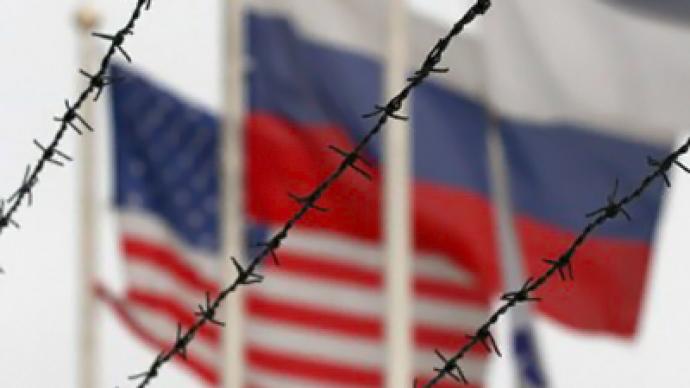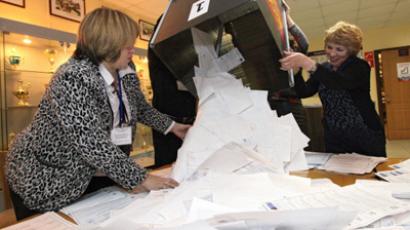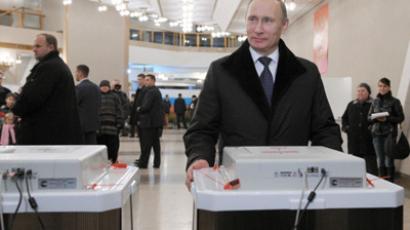Election-meddling fiasco hits US-Russia relations

Revelations about email transactions between the US State Department and the Russian election watchdog Golos prior to Russia's parliamentary elections threaten to bring the reset to a grinding halt.
Before a single vote was cast in the parliamentary elections, a string of incidents indicated that foreign governments were already exerting influence over the election process.Golos, an independent watchdog that has been monitoring elections in Russia for 10 years, was fined 30,000 rubles ($1,000) last week by a Moscow court for publishing “election-related opinion polls and research” after a deadline for publishing such material had passed (it is illegal in Russia to publish such information five days or less before an election). Duma officials who petitioned to start a probe with the prosecutor’s office argued that the NGO was funded by “foreign organizations” hoping to influence the results of the elections.
Watchdogs to guard the watchdogs?
The Russian news website Life News on Friday published emails it claims show correspondence between the US State Department and the Russian election watchdog Golos that detail payments for work done to discredit the results of Russia’s parliamentary vote.Life News reported it has come into the possession of 60 megabytes of Golos' private online correspondence sent and received by Golos Executive Chief Lilya Shibanova and her deputy Grigory Melkonyants. Judging by the published documents, the Russian election watchdog, which claimed to be an independent entity, was actually funded by the US State Department to advance US foreign policy objectives.One letter by Yulia Kostkina, a financial analyst for the United States Agency for International Development (USAID), to Golos Deputy Chief Grigory Melkonyants, reads like a shopping list of demands.“The list of the lacking documents we are expecting from you: Policy and procedures of applying currency rates to Golos accountance and finance reporting; Procurement activities;Procedures of property management considering the procedures, existing in USAID,” Kostkina writes.Judging by the letters in question, there even seems to be a certain “price” Golos paid activists for any report on election violations. Here is a letter by activist Andrey Suvorov to Melkonyants:“Hello, I just wanted to discuss the conditions of our work once again.Like we have defined it, it is piece-rated. What will be the sum for one full appeal based on a violation report?What will be the sum for the detected incorrect report about a violation?Waiting for your answer.If necessary, I will come up with my suggestions.Best regards, Andrey.”Shibanova explained the letters discussing ‘payments’ for violation reports by the fact that Suvorov is a lawyer who really was “piece-paid” for checking such messages. She also told Life News, “this correspondence was attained illegally…and we will apply to the courts.”Meanwhile, US officials have made no secret of their funding of Russian NGOs involved in the monitoring of elections.Despite America’s financial problems, millions of dollars of taxpayer money have been allocated for the purpose of “improving” the Russian elections .“We have, I know, spent more than $9 million to support free and transparent processes for Russia’s upcoming elections,” State Department Deputy Spokesperson Mark Toner said. “Our interest is to support these NGOs that support the process, not necessarily to support… any given political party.”
Reset or Regret?
Even before Russian election monitors had released their official review of the parliamentary vote, US Secretary of State Hillary Clinton was already out of the gate, criticizing the election process as “unfair.”Prime Minister Vladimir Putin had harsh words for Clinton, saying she had “set the tone for some opposition activists, gave them a signal … and [they] started active work.”Speaking at a meeting of the Popular Front Federal Coordinating Council this week, Putin said that “representatives of some foreign states” were paying politically-active NGOs in Russia to “influence the course of the election campaign in our country.” “We need to safeguard ourselves from this interference in our internal affairs and defend our sovereignty,” the Prime Minister said. “It is necessary to think about improving the law and toughening responsibility for those who take orders from foreign states to influence internal political processes.”Putin, stressing that Russia has nothing against the presence of foreign observers at elections, said Russia would draw the line at interference in its internal affairs from abroad."We favor foreign observers monitoring our political electoral processes. We favor this, we are not against this," he said. "However…when financing comes to some domestic organizations which are supposedly national, but which in fact work on foreign money and perform to the music of a foreign state during electoral processes, we need to safeguard ourselves from this interference in our internal affairs and defend our sovereignty.”Meanwhile, Putin, who has announced plans to run in next year’s presidential elections, has pointed out that observers are not admitted to polling stations in the US."People are just kicked out of these polling stations, and that's it. They started admitting some (monitors) just recently. But usually it's like – get out of here. Everything is very tough there, really, and much less liberal," he said.The war of words that has erupted between Moscow and Washington comes at a time of increasing tensions between the two nuclear powers. Following the near-collapse in negotiations over US-NATO plans to build a missile defense system in Eastern Europe, Russia, which has been denied participation in the project and now views the system as a threat to its national security, is threatening to deploy ballistic missiles in Kaliningrad. The question that observers are now asking is: is the recent fallout in bilateral relations a symptom of election-year rhetoric, or of much deeper problems between the two countries?Robert Bridge, RT














